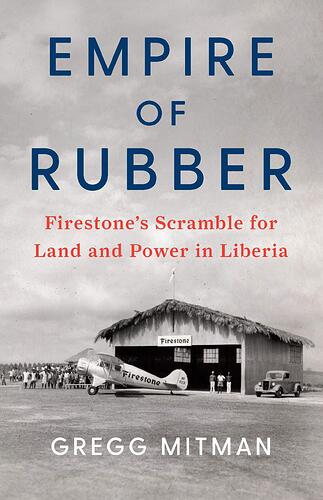Looking for a good read? Here is a recommendation. I have an unusual approach to reviewing books. I review books I feel merit a review. Each review is an opportunity to recommend a book. If I do not think a book is worth reading, I find another book to review. You do not have to agree with everything every author has written (I do not), but the fiction I review is entertaining (and often thought-provoking) and the non-fiction contain ideas worth reading.
Book Review
Rubber in Liberia
Reviewed by Mark Lardas
October 31, 2021
“Empire of Rubber: Firestone’s Scramble for Land and Power in Liberia,” by Greg Mitmann, The New Press, 2021, 288 pages, $27.99 (hardcover) $15.39 (ebook)
In the first decades of the twentieth century rubber changed from a material that was a sometime useful curiosity into a vital strategic asset. This was especially true in the heavily-industrialized United States, with a massive demand for rubber in both transportation and industry. The problem was the United States controlled no sources of rubber. Every pound came from foreign countries or colonies controlled by foreign countries.
“Empire of Rubber: Firestone’s Scramble for Land and Power in Liberia,” by Greg Mitmann tells of one US attempt to circumvent that shortfall. It relates how Firestone, a US company, with the support of the US government established and ran rubber plantations in Liberia between the 1920s and the 1980s.
Liberia an independent nation on Africa’s Slave Coast was established in 1822 by the United States. One of three independent nations in Africa in 1920, it was not a colony. It was settled by free blacks from the United States, part of an effort to solve the US’s slave issue by returning blacks to Africa. For the United States, its historic ties with the United States made it an ideal choice for “American” rubber.
Mitmann reveals the intricate three-handed game played in the 1920s and 1930s as Firestone set up its plantations. The sides included Firestone and its US owners, Liberia’s ruling class made up blacks who came from the US and the indigenous blacks who occupied Liberia when the American blacks colonized it. Racism against blacks was at its height in the 1920s United States, but all three sides behaved badly towards the others, each seeking to advance themselves at the expense of the other two groups.
Mitmann traces Firestone’s successes and reversals. It took place against the rise of both fascism and communism, in an era in which the Great Depression left an indelible mark. It matured in the late 1930s, just in time to provide the West an alternate source of rubber during World War II.
One of the book’s fascinating revelations was that Progressives have changed little in 100 years. The American charge into Liberia was led by Ivy League Progressives seeking to uplift and educate the rude natives, just as they do today. Back then the rude natives were the indigenous “uneducated” blacks of Liberia just as today they are the indigenous “uneducated” whites in the US heartland. The condescension and sense of superiority remains the same, even if the focus differs.
“Empire of Rubber” is a revealing look at a complex topic. Mitmann offers a nuanced look at a subject that is too frequently oversimplified and caricaturized.
Mark Lardas, an engineer, freelance writer, historian, and model-maker, lives in League City. His website is marklardas.com .
